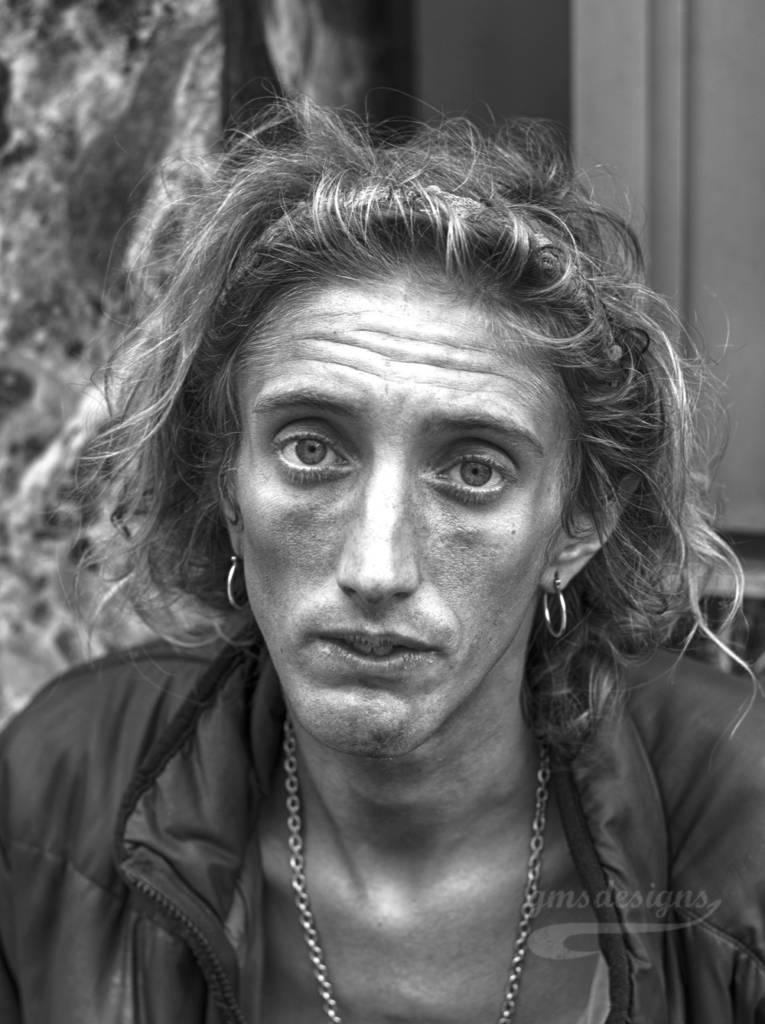This is Evelyn. She had been living homeless in Washington, D.C. for five years when Gerry Suchy met her in 2014, sitting in an alcove outside of Metro Center.
“She has no idea what she’ll be doing in the near future and cannot foresee much beyond the immediate problem of finding food and shelter. Life is very hard for someone like Evelyn, and being invisible makes it harder. Keep that in mind if you see her or someone like her,” wrote Suchy alongside her close-up, black and white portrait.
He asked what it was like for her to sit outside and watch masses of people walk by without looking at her.
“You know, I feel like a ghost – I feel like I’m invisible,” she replied.
Invisible. That word stings, but it appears to be an accurate depiction of society’s general ability to acknowledge many of its neighbors who call the streets home.
It was this notion that inspired Suchy’s photo project The Invisible Ones, where Evelyn’s photo is now accompanied by many others, each with unique stories and reasons for being there.
He has been using street photography since then as a means of encouraging others to think more deeply about homelessness, and what they can do to help. Suchy’s intended outcome is simple: to raise awareness that, as well-to-do and powerful as Washington is, there’s a whole class of people who will not be a part of it unless each person takes responsibility to raise them up.
This May, Suchy was surprised to receive a phone call from across the country about his project, which unknowingly echoed the mission of Homeless in Seattle’s Just Say Hello movement. The campaign aims to remind people of the immense impact a simple act of kindness can have.
Suchy – photographer and former social worker – is no stranger to the power of saying hello.
“I see people sitting there panhandling, and hundreds of people walk by but they don’t look at them. They even cross the street to avoid looking at them. They do all kinds of things not to interact. And so I would then go across the street and chat with them,” said Suchy in an interview with Street Sense.
A similar emphasis on photo-based storytelling began when Homeless in Seattle founder Rex Hohlbein started a Facebook page to help break stigmas and view homelessness through a new lens.
Hohlbein captures chillingly beautiful black and white portraits of homeless people he meets around Seattle and shares each person’s backstory on the page. He also shares what they most need: socks, a tent, or a winter coat. Each photo – more than just a face – holds the story of a person who deserves compassion just as much as anyone else.
Seventeen thousand Facebook “likes” later and a notable 100 percent of requests-for-help met, Hohlbein pioneered the Just Say Hello movement to change perceptions beyond Seattle. Just Say Hello is represented in places from Boulder, Colorado to Victoria, Canada and now in Washington D.C.
Hohlbein had always been familiar with local homelessness. He could tell you that 1,100 people in his county live in their vehicles or that 3,700 people in that same county are unsheltered. But his perception of homelessness changed when he met a man named Chiaka.
“I was utterly struck by the depth and beauty of Chiaka’s being,” Holbein said in his keynote at the global street paper summit held in Seattle on June 24.
It was on a rainy Seattle day in 2010, when Hohlbein was compelled to act differently and approached a man sleeping near the curb of his architecture office. He tapped him on the shoulder and told him that, when he woke up and if he wanted to, he was welcome to come over to his house for a cup of tea.
About an hour later, Hohlbein was sitting in his home with Chiaka.
The two quickly became friends, and it was only moments later that Hohlbein discovered what an incredible artist Chiaka was. As Chiaka began to share his stories, paintings, and canvas work, he explained that he’d been living on the streets of Seattle for about ten years and sold his art to buy food and supplies.
“I realized then what Chiaka had done for me. He had blown apart negative stereotypes of homelessness,” Hohlbein said.
By sharing a version of himself that extended beyond homelessness, Chiaka helped Hohlbein recognize the power in understanding a person’s story.
He set up a Facebook page to showcase Chiaka’s art and spread the word. The response was overwhelming: people all around Seattle were purchasing Chiaka’s paintings and commissioning new ones. Hohlbein realized it didn’t have to stop there, and launched Homeless in Seattle.
“Just say hello. By giving your smile or your words, you can make someone feel seen, loved, and connected to their community,” concluded Hohlbein.
As Just Say Hello continues to spread, Suchy hopes to form a greater partnership with the Homeless in Seattle team. In just a couple of weeks, he’ll be visiting Seattle to meet them for the first time.
“I would really like to do whatever I can do to help [Hohlbein] get other people on board with this project in other cities,” said Suchy. “Chicago isn’t there; New York City isn’t there; Los Angeles isn’t there. But these kinds of photographs, if done well, can be really powerful. You look into their eyes and, even with no text, you get their story.”
You can support Homeless in Washington, D.C. by liking the Facebook page or “just saying hello.”




